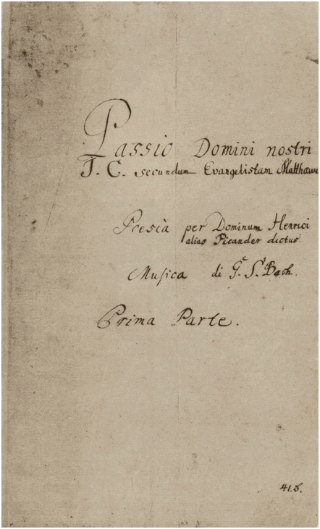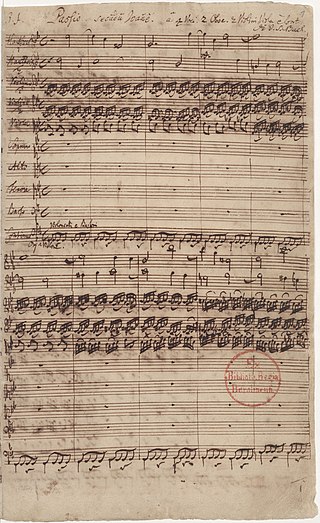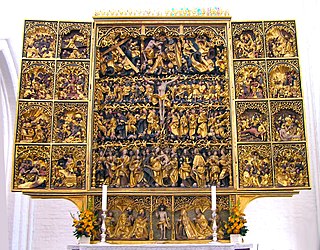St John Passion or, in Latin, Passio Domini Nostri Iesu Christi secundum Ioannem, refers to the Passion of Christ as told in chapters 18 and 19 of the Gospel of John.

The St Matthew Passion, BWV 244, is a Passion, a sacred oratorio written by Johann Sebastian Bach in 1727 for solo voices, double choir and double orchestra, with libretto by Picander. It sets the 26th and 27th chapters of the Gospel of Matthew to music, with interspersed chorales and arias. It is widely regarded as one of the greatest masterpieces of Baroque sacred music. The original Latin title Passio Domini nostri J.C. secundum Evangelistam Matthæum translates to "The Passion of our Lord J[esus] C[hrist] according to the Evangelist Matthew".
The Passionists, officially named Congregation of the Passion of Jesus Christ, abbreviated CP, is a Catholic clerical religious congregation of Pontifical Right for men, founded by Paul of the Cross in 1720 with a special emphasis on and devotion to the Passion of Jesus Christ. A known symbol of the congregation is the labeled emblem of the Sacred Heart of Jesus, surmounted by a cross and is often sewn into the attire of its congregants.

The Passio secundum Joannem or St John Passion, BWV 245, is a Passion or oratorio by Johann Sebastian Bach, the older of the surviving Passions by Bach. It was written during his first year as director of church music in Leipzig and was first performed on April 7, 1724, at Good Friday Vespers at the St. Nicholas Church.
Antoine de Longueval was a French singer and composer of the Renaissance. A contemporary of Josquin des Prez, he was singing master of the French royal chapel under King Francis I, and was important in the history of the polyphonic setting of the Passion.
St Mark Passion refers to the Passion of Christ as told in chapters 14 and 15 of the Gospel of Mark.

Passio Domini Nostri Jesu Christi secundum Joannem is a passion setting by Arvo Pärt for solo baritone (Jesus), solo tenor (Pilate), solo vocal quartet (Evangelist), choir, violin, oboe, cello, bassoon and organ. The work lasts approximately 70 minutes and is a setting of the Latin text from the Gospel of John, chapters 18 and 19, plus a brief introduction and conclusion.
Paschale Mysterium is Latin for "The mystery of Easter". The words have been used as the title of albums of Gregorian chant for Easter.

In Christian music, a Passion is a setting of the Passion of Christ. Liturgically, most Passions were intended to be performed as part of church services in the Holy Week.

The Ordinalia are three medieval mystery plays dating to the late fourteenth century, written primarily in Middle Cornish, with stage directions in Latin. The three plays are Origo Mundi, Passio Christi and Resurrexio Domini. The metres of these plays are various arrangements of seven- and four-syllabled lines. Ordinalia means "prompt" or "service book".
St Matthew Passion is a Passion setting composed by Johann Sebastian Bach in 1727 or 1729.
Johann Georg Kühnhausen was a German composer.

The Evangelist in the music of Johann Sebastian Bach is the tenor part in his oratorios and Passions who narrates the exact words of the Bible, translated by Martin Luther, in recitative secco. The part appears in the works St John Passion, St Matthew Passion, and the Christmas Oratorio, as well as the St Mark Passion and the Ascension Oratorio Lobet Gott in seinen Reichen, BWV 11. Some cantatas also contain recitatives of Bible quotations, assigned to the tenor voice.

Vox Christi, Latin for Voice of Christ, is a setting of Jesus' words in a vocal work such as a Passion, an Oratorium or a Cantata. Conventionally, for instance in Protestant music of the Baroque era, the vox Christi is set for a bass voice.

Sehet, wir gehn hinauf gen Jerusalem, BWV 159, is a church cantata by Johann Sebastian Bach. He composed it in Leipzig for the Sunday Estomihi, the last Sunday before Lent, and probably first performed it on 27 February 1729. The gospel reading for the Sunday, from the Gospel of Luke, includes Jesus announcing his suffering and death in Jerusalem. The cantata's theme and Bach's music foreshadow his Passion.

Passio Olavi, more correctly Passio a miracule beati Olavi is a collection of legends about the Norwegian national saint Olaf II the Holy. The text was probably collected while Eysteinn Erlendsson was Archbishop of Nidaros (1159-1188), and is possibly written by Eysteinn himself. Egil Kraggerud dated the Passio Olavi to ca. 1150–1160.

The structure of the St John Passion, BWV 245, a sacred oratorio by Johann Sebastian Bach, is "carefully designed with a great deal of musico-theological intent". Some main aspects of the structure are shown in tables below.
Johannes Heroldt was a German composer best known for his six-part St Matthew Passion composed at Klagenfurt in 1594.

"Da der Herr Christ zu Tische saß" is a Christian hymn related to the Passion of Jesus. The 28 stanza text was written by Nikolaus Herman and first published in 1560. Later Johann Sebastian Bach composed the four-part setting, BWV 285.









